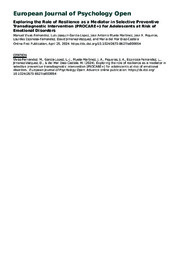Por favor, use este identificador para citar o enlazar este ítem:
https://hdl.handle.net/11000/36193Registro completo de metadatos
| Campo DC | Valor | Lengua/Idioma |
|---|---|---|
| dc.contributor.author | Vivas-Fernandez, Manuel | - |
| dc.contributor.author | Garcia-Lopez, Luis Joaquín | - |
| dc.contributor.author | Muela-Martinez, Jose Antonio | - |
| dc.contributor.author | Piqueras, Jose A. | - |
| dc.contributor.author | Espinosa-Fernandez, Lourdes | - |
| dc.contributor.other | Departamentos de la UMH::Psicología de la Salud | es_ES |
| dc.date.accessioned | 2025-03-27T13:14:45Z | - |
| dc.date.available | 2025-03-27T13:14:45Z | - |
| dc.date.created | 2024 | - |
| dc.identifier.citation | European Journal of Psychology Open (2024) | es_ES |
| dc.identifier.issn | 2673-8627 | - |
| dc.identifier.uri | https://hdl.handle.net/11000/36193 | - |
| dc.description.abstract | Introduction: Psychological treatments are becoming an increasingly important component of medical healthcare, as a growing number of people seek treatment for a wide range of mental health problems. While these treatments are known to be effective, much remains to be understood about their mechanisms and reasons for effectiveness. The study of statistical mediators is crucial in psychological research, as it is fundamental to understanding how psychological factors influence health, well-being, and human behavior, and thus to designing effective psychological interventions. Aim: This study investigates the role of resilience as a treatment mediator in PROCARE+, a brief transdiagnostic, personalized protocol for the selective prevention of emotional disorders in adolescents. This approach has proven effective for young people at risk of developing emotional issues. Method: We used simple mediation models in a sample of 153 adolescents to assess the impact of interventions on resilience. Outcome variables included self-reported and parent-reported emotional risk, mood, anxiety symptoms, and quality of life. Discussion: The results of this study provide valuable information on how PROCARE+ works and how to improve its effectiveness, pointing to resilience as a key mediator in reducing the risk of developing emotional disorders and improving quality of life. | es_ES |
| dc.format | application/pdf | es_ES |
| dc.format.extent | 15 | es_ES |
| dc.language.iso | eng | es_ES |
| dc.publisher | Hogrefe | es_ES |
| dc.rights | info:eu-repo/semantics/openAccess | es_ES |
| dc.rights | Attribution-NonCommercial-NoDerivatives 4.0 Internacional | * |
| dc.rights.uri | http://creativecommons.org/licenses/by-nc-nd/4.0/ | * |
| dc.subject | adolescence | es_ES |
| dc.subject | anxiety | es_ES |
| dc.subject | depression | es_ES |
| dc.subject | mediation | es_ES |
| dc.subject | selective prevention | es_ES |
| dc.subject | resilience | es_ES |
| dc.subject.other | CDU::1 - Filosofía y psicología::159.9 - Psicología | es_ES |
| dc.title | Exploring the Role of Resilience as a Mediator in Selective Preventive Transdiagnostic Intervention (PROCARE+) for Adolescents at Risk of Emotional Disorders | es_ES |
| dc.type | info:eu-repo/semantics/article | es_ES |
| dc.relation.publisherversion | https://doi.org/10.1024/2673-8627/a000054 | es_ES |

Ver/Abrir:
2024_80204-002024_1.pdf
812,1 kB
Adobe PDF
Compartir:
 La licencia se describe como: Atribución-NonComercial-NoDerivada 4.0 Internacional.
La licencia se describe como: Atribución-NonComercial-NoDerivada 4.0 Internacional.
.png)